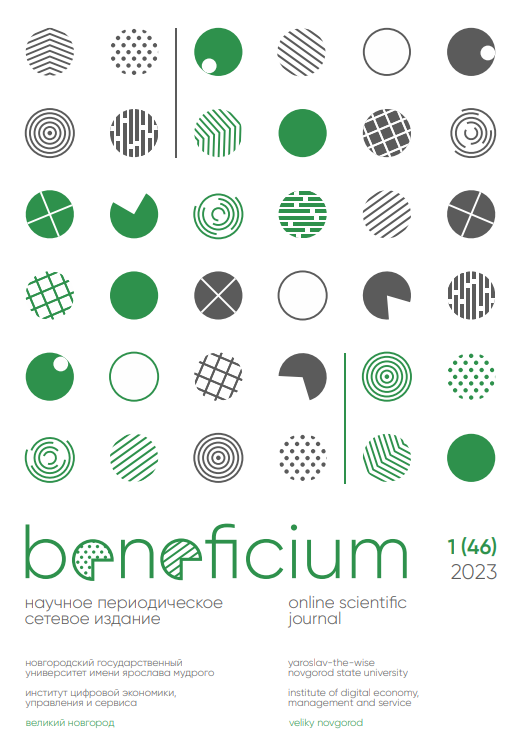THE IMPLEMENTATION OF THE KAIZEN SYSTEM FOR MANUFACTURING ENTERPRISES QUALITY MANAGEMENT
Аннотация
The article discusses the theoretical, methodological and practice aspects of quality management in a manufacturing enterprise, presents the results of an analysis of the costs of quality management. The relevance of the study is due to the modern business conditions among the owners of manufacturing enterprises associated with the production of products at the lowest cost and the highest profit, regardless of the quality of the products. This situation has negative consequences for all participants in the production process, since it contributes to the weakening of the manufacturing sector as a whole; negatively affects product manufacturers in terms of reducing their competitiveness; and increases the number of end consumers of products dissatisfied with its quality. The purpose of the study is to analyze the costs of continuous improvement of the quality management system of manufacturing enterprises that contribute to the growth and development of industries and increase their competitiveness in the world market. Kaizen is used as a methodology, its main principles and types, the benefits that an enterprise receives when using this method are described. The results of the analysis of the possibilities of using the Kaizen methodology in production and its role in reducing the cost of quality in manufacturing enterprises are presented. The authors conducted a study of the proposed methodology to reduce the costs associated with defective products, showed the most important results and made some recommendations to detect suspicious results and reduce quality costs. The paper emphasizes the importance of applying the Kaizen methodology in the activities of manufacturing enterprises on the example of the object of study – the General Company of the Tire Industry in the Iraqi city of An-Najaf.
Keywords: Kaizen, manufacturing enterprises, quality costs, quality management
References
Dewi V.A., Imron A., Wiyono B.B. [et al.]. The role of Kaizen and human resource quality on the quality assurance system in medical students // Cypriot Journal of Educational Sciences. 2022. Vol. 17(7). Pp. 2474-2492. DOI: 10.18844/cjes.v17i7.7682
Al-Baik O., Miller J. Integrative double kaizen loop (IDKL): Towards a culture of continuous learning and sustainable improvements for software organizations // IEEE Transactions on Software Engineering. 2019. Vol. 45(12). Pp. 1189-1210. DOI: 10.1109/TSE.2018.2829722
Garza-Reyes J.A., Kumar V., Chaikittisilp S., Tan K.H. The effect of lean methods and tools on the environmental performance of manufacturing organizations // International Journal of Production Economics. 2018. Vol. 200. Pp. 170-180. DOI: 10.1016/j.ijpe.2018.03.030
Sullivan K., Topper L., Rajwani A. Redesigning patient flow in orthopedics and radiology clinics via a three-phase 'Kaizen' improvement approach and interrupted time series analysis // International Journal for Quality in Health Care. 2022. Vol. 34(3). DOI: 10.1093/intqhc/mzac061
Cherrafi A., Elfezazi S., Hurley B. [et al.]. Green and lean: A Gemba–Kaizen model for sustainability enhancement // Production Planning and Control. 2019. Vol. 30(5-6). Pp. 385-399. DOI: 10.1080/09537287.2018.1501808
Flug J.A., Stellmaker J.A., Sharpe R.E. [et al.]. Kaizen process improvement in radiology: Primer for creating a culture of continuous quality improvement // Radiographics. 2022. Vol. 42(3). Pp. 919-928. DOI: 1148/rg.210086
Glover W.J., Farris J.A., Van Aken E.M., Doolen T.L. Critical success factors for the sustainability of Kaizen event human resource outcomes: An empirical study // International Journal of Production Economics. 2011. Vol. 132(2). Pp. 197-213. DOI: 10.1016/j.ijpe.2011.04.005
Ighravwe D.E., Oke S.A. Sustenance of zero-loss on production lines using Kobetsu Kaizen of TPM with hybrid models // Total Quality Management and Business Excellence. 2020. Vol. 31(1-2). Pp. 112-136. DOI: 10.1080/14783363.2017.1415754
Atta-Ankomah R., Appiah Kubi J., Ackah C.G. The effect of Kaizen on performance: Evidence from manufacturing enterprises in Ghana // European Journal of Development Research. 2022. Vol. 34(2). Pp. 1167-1192. DOI: 1057/s41287-021-00459-0
García J.L., Maldonado A.A., Alvarado A., Rivera D.G. Human critical success factors for Kaizen and its impacts in industrial performance // International Journal of Advanced Manufacturing Technology. 2014. Vol. 70(9-12). Pp. 2187-2198. DOI: 10.1007/s00170-013-5445-4
Craig B.M., Rand K., Hartman J.D. Preference paths and their Kaizen tasks for small samples // Patient. 2022. Vol. 15(2). Pp.187-196. DOI: 10.1007/s40271-021-00541-z
Randhawa J.S., Ahuja I.S. 5S – a quality improvement tool for sustainable performance: Literature review and directions // International Journal of Quality and Reliability Management. 2017. Vol. 34(3). Pp. 334-361. DOI: 10.1108/IJQRM-03-2015-0045
About the Authors
Christina V. Drokina – Cand. Sci. (Economics); Associate Professor, Southern Federal University, Taganrog, Russia. E-mail: kvdrokina@sfedu.ru. SPIN РИНЦ 3330-8159. ORCID 0000-0003-4263-0302. ResearcherID C-5789-2017
Fatema Fakhro – Graduate Student, Southern Federal University, Taganrog, Russia. E-mail: fakro@sfedu.ru
For citation: Drokina C.V., Fakhro F. The Implementation of the Kaizen System for Manufacturing Enterprises Quality Management // BENEFICIUM. 2023. Vol. 1(46). Pp. 80-85. DOI: 10.34680/BENEFICIUM.2023.1(46).80-85









